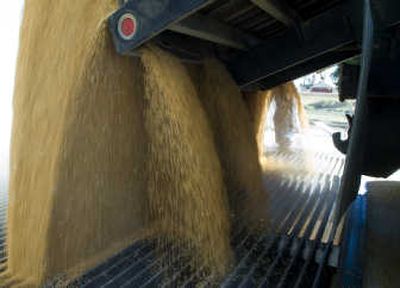Farmers’ profits help boost area businesses

DAVENPORT, Wash. – Taylor Warwick and Cody Johnston are “wheat rats.”
The two men in their early 20s are spending these hot August afternoons at the Davenport Union Warehouse Co. emptying grain trucks, as dust from wheat chaff sticks to their skin and hair.
But the money is good and the work – they are officially called “dump bay hosts” – is temporary.
Within weeks, this year’s banner harvest across Lincoln County will be completed. Record wheat prices over $6.50 a bushel are making even the most mundane, dirty harvest jobs a bit easier to tolerate, said Warwick, as a 700-bushel grain truck pulls up.
In dollars and cents, that’s a $4,200 payload that takes just a few minutes to dump at the grain elevator.
The high prices mean the 300-member farmers’ cooperative will be a $25 million business in Davenport, a city of 1,800 about 30 miles west of Spokane.
“In the farming communities, this sort of price affects everyone,” said Ed Stoner, manager of Davenport Union Warehouse. “When farmers are doing well, everyone is doing well.”
High wheat prices have created an upbeat atmosphere on a Main Street dotted with banks, car dealers, hardware stores and other shops and services.
“It can only mean good things,” said Colin Guhlke, who farms with his family and sells cars at Elliott Motors. “We’re definitely hoping that some folks will be able to buy this fall.”
John Hendrickson, owner of Hendrickson’s Finishing Touch flooring shop, said he anticipates that some of the money being reaped from the golden grain fields will mean more business.
“I think we’ll benefit,” he said. “People around here like to keep their money local.”
Indeed, Davenport sells itself as a self-sustaining wheat city with a tourism twist. It is a gateway for boat and cabin traffic headed to Lake Roosevelt.
And it’s just far enough from competitors in Spokane that the town, where the median family income is $47,700, can maintain essential services.
As the seat of the second-largest wheat producing county in the United States, after Whitman County south of Spokane, Davenport needs the extra tax revenues to fund services including schools, city government and health care.
“I’ve been here 28 years and I’ve never seen prices that give the farmer more than $6 a bushel,” said Stoner.
The only downside is that the crop will be about average. Farmers had been hoping for a bin-buster, but the July heat set back spring crops.
“That’s about the only disappointment around here,” Stoner said.
Davenport’s coming good fortune reflects the feelings across farm country this summer. Resilient small towns that weathered tough years of a down-and-out farm economy – leaving scars such as empty storefronts – are poised to end 2007 on high note.
“Though it’s not anywhere near the bonanza it was in the 1970s, farmers should be healing up this year,” said Odessa accountant Todd King.
“Things are finally going in the right direction. For small towns, too.”